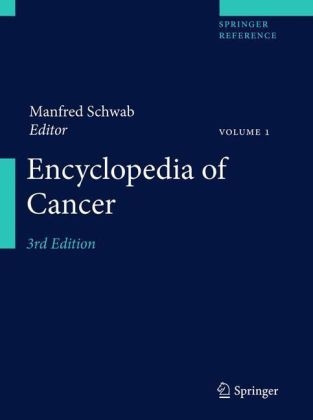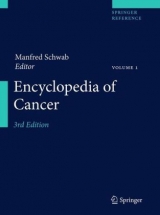Encyclopedia of Cancer
Springer Berlin (Verlag)
978-3-642-16482-8 (ISBN)
- Titel erscheint in neuer Auflage
- Artikel merken
Recent developments are seeing a dynamic progress in basic and clinical cancer science, with translational research increasingly becoming a new paradigm in cancer research. In particular, new approaches to both Personalized Cancer Medicine and Targeted Therapies have made promising progress. While the Second Edition featured scholarly contributions from approximately 1.000 scientists/clinicians in four Volumes, the Third Edition includes 1.300 contributors in 7 Volumes with an A-Z format of approx. 7000 entries. It provides definitions of common acronyms and short definitions of related terms and processes in the form of keyword entries. In addition, there are detailed essays, which provide comprehensive information on syndromes, genes and molecules, and processes and methods. Each essay is well-structured, with extensive cross-referencing between all entries. In the Third Edition, topical Essays present a comprehensive picture of major cancers, such as Breast Cancer, Colorectal Cancer, Prostate Cancer, Ovarian Cancer, Renal Cancer, Lung Cancer, and Hematological Maligancies, Leukemias and Lymphomas. For each of these cancers, different authoritative Essays are included that cover topics ranging from Pathology, to Clinical Oncology and Targeted Therapies. This new feature should meet the expectance that a wide community has towards a major cancer reference works.
The Encyclopedia of Cancer will be accessible both in print and online, and this information source should be of value to both the clinical and basic scientific community as well as to the public.
Professor Manfred Schwab is the Head of the Division of Tumor Genetics at the German Cancer Research Center (DKFZ) in Heidelberg, Germany. He holds academic affiliations with the Medical Faculty of the University of Heidelberg and with the Biology Faculty of the University of Kaiserslautern. His current research interest is in translational aspects of the biology and genetics of neuroblastoma and in the contribution of genes at “common fragile sites” to genetic instability and cancer. Manfred Schwab received his PhD from the University of Giessen, Germany, where he also concluded his Habilitation, the formal entrance point for becoming a Professor. Subsequently, he was awarded a 5-year Heisenberg fellowship by the German Research Council (DFG) that allowed him to perform scientific work in any international laboratory. He choose to join the laboratory of Mike Bishop and Harold Varmus in San Francisco where, using chicken models, genes causing cellular transformation (“oncogenes”) had just been identified. There, in 1985, he was appointed “Assistant Professor”. In 1987, he joined the German Cancer Research Center, where he has worked since. In 1992, he received the „Deutscher Krebspreis” (National Cancer Award), and in 1998 the Gerhard Domagk Award. Throughout his scientific career Manfred Schwab has been interested in and actively contributed to tumor genetics, continuously trying to follow original avenues. His initial work focused on a genetic melanoma model in fish, where he worked out the role of genetic factors in tumor susceptibility, predominantly for melanoma. This work also uncovered a genetic susceptibility for neuroblastoma, published in 1978 in the international journal “Cancer Research”. Working in San Francisco, Manfred Schwab turned to human neuroblastoma, the most frequent extracranial cancer in young children. His most significant personal scientific contributions include *first establishment and use of parallel (array) analysis for mRNA expression profiling (Schwab et al. (1983) Nature 303, 497-501*discovery of the MYCN-gene and its amplification in neuroblastomas using mRNA expression profiling (Schwab et al. (1983) Nature 305:245-248)*work out MYCN-transforming functions (Schwab et al. (1985) Nature 316, 160-162)*localization of amplified MYCN to previously enigmatic abnormal chromosomal structures specific to tumor cells (Schwab et al. (1984) Nature 308, 288-291) Amplified MYCN was the very first identified oncogenetic biomarker, now in clinical use worldwide for personalized therapy design of neuroblastoma (Schwab et al. (2003) Lancet Oncology 4:472-480). Manfred Schwab has been a Member, or Chairperson, of numerous national and international grant review and award committees. Throughout his scientific career he has received major science grants. He has been the Coordinator (together with A. Eggert) of Research Network “Systems Biology of Embryonal Tumors: Neuroblastoma as a Model” within National Genome Research Network (NGFN-2), funded by Federal Ministry of Research and Technology, and is now Coordinator (with A. Eggert) of Research Network “ENGINE” Extended Neuroblastoma Genome Interaction NEtwork (ENGINE): Further Steps Towards Personalized Medicine” within NGFN-plus. Manfred Schwab is Editor-in-Chief of the international journal “Cancer Letters” (IF 3.75). Manfred Schwab is married to Christel Schwab. They have 3 children, Felix (PhD in Physics), Philipp (Doctor of Philosophy), and Charlotte (studying Medicine).
From the reviews of the third edition:
"It aims to be comprehensive and is targeted at clinicians, researchers, and advanced students. ... Entries are clear, well written, make use of appropriate diagrams and images, and are geared toward clinicians and researchers. ... The content of The Encyclopedia of Cancer is excellent ... . Highly recommended for libraries supporting doctors, hospitals, medical schools, researchers, graduate level students, and healthcare professionals." (Alisa Mizikar, Reference Reviews, Vol. 27 (1), 2013)
"The Encyclopedic Reference of Cancer is a landmark achievement in the domain of cancer research. I am pleased to have been asked to participate as it includes contributions from leading cancer experts world-wide. This reference book will set new standards and will be very useful for scientists and clinical oncologists alike." Paul Kleihues, M.D., Previous Director - International Agency for Research on Cancer (IARC), Lyon, France.
" The Encyclopedia of Cancer is more than simply a reference book for cancer topics. It's a compendium of the achievements of numerous scientists who've toiled in the world. The thousands of entries are a blend of brief but comprehensive introduction to the up-to-date information about various cancers and cancer-related topics. I like the extensive cross-referencing and it is very useful to the readers. I am honored to contribute to this timely and exciting endeavor. The Encyclopedia of Cancer is a valuable resource for cancer investigation, which provides all-round information for basic, translational and clinical scientists in the area of cancer. " William C.S. Cho, PhD, FIBMS, Chartered Scientist, Department of Clinical Oncology, Queen Elizabeth Hospital, Hong Kong
| Reihe/Serie | Encyclopedia of Cancer |
|---|---|
| Zusatzinfo | LXXXVI, 3984 p. 1047 illus., 295 illus. in color. In 7 volumes, not available separately. |
| Verlagsort | Berlin |
| Sprache | englisch |
| Maße | 193 x 260 mm |
| Gewicht | 9275 g |
| Themenwelt | Medizin / Pharmazie ► Studium |
| Schlagworte | Cancer • carcinogen • karzinogen • Krebs • Krebsforschung • Malignität • Tumor • tumour |
| ISBN-10 | 3-642-16482-X / 364216482X |
| ISBN-13 | 978-3-642-16482-8 / 9783642164828 |
| Zustand | Neuware |
| Haben Sie eine Frage zum Produkt? |
aus dem Bereich





